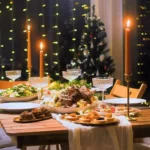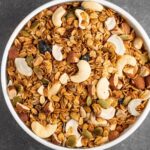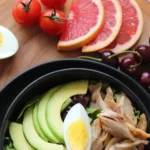Did you know that what you eat can affect how well your brain functions? There are certain foods that support cognitive learning, and it is important to include them in your diet if you want to optimize your brainpower. In this blog post, we will discuss the top five foods that help improve cognitive function. Read on to learn more!

Are There Foods That Support Cognitive Learning?
Eating certain types of foods can contribute to enhanced cognitive learning, giving us the mental energy and focus we need to retain information. While candy bars and sugary sodas can give you a quick surge of energy for studying, in the long run, these unhealthy snacks will do little for your brain’s ability to learn and remember.
Instead, look for foods full of minerals, vitamins, and antioxidants to provide you with the best nutrition for improved cognitive functioning. Foods such as nuts, fatty fish, and leafy green vegetables are perfect sources of essential nutrients that support our thinking skills while also tasting delicious! So put down the chips and reach for something healthy!
A List of High-Energy Foods You Should Consume
Feeling unable to move or even think? Feeling ready to drop school… kind of? Feeling sleepy and sluggish and would rather buy research papers online than do homework? Feeling fatigued and unable to concentrate may not be because you’re lazy. It can be rather because your diet is lacking the right nutrients for optimal brainpower. If that’s the case, you should revise your diet and come up with a list of foods to eat that support cognitive learning. Here are some foods you should be consuming. In fact, check out ten of the best high-energy foods to perk you up.
1) The protein-rich quinoa. Known as the “complete grain” that fills your stomach but won’t weigh you down.
2) The antioxidant-rich berries. Whether you prefer strawberries, blueberries, raspberries, or blackberries, these little super fruits help fight inflammation and protect your brain cells from damage.
3) Green leafy vegetables such as spinach, kale, and other greens provide essential vitamins and minerals. They also contain brain-boosting phytonutrients such as lutein and beta-carotene.
4) Salmon is an excellent source of omega-3 fatty acids to energize your body. It is also a rich source of protein and vitamin D, which promotes healthy brain function.
5) Yogurt – full of probiotics that make digestion smoother, it will also help your body absorb the other brain-supporting foods you consume.
6) Avocado – packed with healthy fats, this fruit can give your energy levels a real boost.
7) Dark chocolate – the dark variety is high in caffeine and antioxidants, giving your brain a delicious boost.
8) A handful of nuts such as almonds or pistachios for healthy fats without going overboard. They will also help keep your focus and concentration sharp.
9) Chia seeds, are great for adding both energy and fiber. You can find them in any grocery store and they are very affordable.
10) Last but not least, start your weekend with a bang with a cup of java for its antioxidant properties. You can also get a new energy boost with coffee, tea, or even yerba mate for that extra kick. Dive in!
Incorporating These Foods Into Your Diet
One easy way to start incorporating healthier foods into your diet is to set yourself a weekly goal. It could be as simple as replacing one snack with a piece of fruit or having two more servings of vegetables each day.
If you’re not sure where to start, shop the perimeter of the grocery store. The items here are generally going to be healthier than those found in the inner aisles. When cooking, opt for lighter options such as grilling instead of deep frying, or use seasonings and herbs instead of sauces and condiments.
Other ideas include snack prepping for the whole week. This might mean preparing something like trail mix or wedges beforehand so that if you do have an urge for that unhealthy snack, you can reach for something more nutritious.
What Foods Should You Avoid As a Student?
As a student, it’s important to make healthy eating decisions. While food is important for providing us with energy for studying and other day-to-day activities, certain foods are not so beneficial for our bodies or minds.
Generally speaking, processed and fast foods should be avoided as much as possible, since these can lead to weight gain and unhealthy eating habits. It might also be wise to limit your intake of salty snacks such as chips or crackers, or sugary treats like candy bars. Eating too much of either will prevent you from feeling your best during exams and lectures!
Fueling up on a balanced meal that contains fruits, vegetables and lean proteins is the way to go if you want to maintain optimal health while studying.
Healthy foods for studying: FAQ
Here are some frequently asked questions about healthy foods for studying.
Fruits, vegetables, whole grains, nuts, seeds and lean protein all provide sustainable energy and important nutrients for your studies.
Everyone is different so it’s best to experiment a bit with your eating schedule. A good rule of thumb is to aim for small snacks every 2-3 hours. This helps prevent feeling sluggish or overeating at meals.
Staying hydrated while you study not only keeps you alert but also energized. Water is best – aim for 64-80 ounces per day, though herbal teas can also help provide an extra boost of flavor.
Eating healthy while studying isn’t always easy but it can make a huge difference in how well you comprehend the material and stay focused throughout the process!
Conclusion
Whether you’re studying for an exam or preparing for a long day of lectures and readings, it’s important to make healthy eating decisions. By incorporating high-energy foods such as fruits, vegetables, whole grains and lean protein into your diet, you can improve both your physical and mental health while meeting the demands of academic life. So fuel up with foods that energize and support cognitive learning, and avoid processed or fast foods whenever possible!
Looking for more tips on healthy eating as a student? Check out our blog for additional advice and information. Good luck with your studies, and happy eating!














Leave a Reply